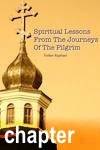 Jesus our Lord and Savior, washed the feet of His disciples, paving the way for us to show love to others.
Jesus our Lord and Savior, washed the feet of His disciples, paving the way for us to show love to others.
Dear beloved,
The judge and his wife, who were hosting the pilgrim, were kind loving Christians who looked after the weak and the poor. They found the pilgrim lacking socks and had broken shoes, and the judge’s wife made a pair of socks and gave a pair of shoes to the pilgrim. The pilgrim at first resisted the kindness, but the kind couple told him that even Jesus Christ washed the feet of His apostles (St John 13:1-17).
Many of us have been exceedingly blessed beyond what we deserve. When we are blessed with a job to feed our families, when we have a roof over our heads, people who care for us, do we appreciate such Divine grace and mercy? What then, do we do with these blessings? Do we hear Christ who said to us, that we would take care of those who are not well, who are poor, who are in need (St Matthew 25:34-40)? We can find many stories of the Holy Unmercenaries, such as Saint Panteleimon from the fourth century, saints who gave their lives to the healing of others without accepting payment. If even Christ our Lord would bend down and wash the feet of His apostles, common men, should we not also follow what He told us to do, to bend ourselves down in true humility, and love those who have been sent our way by God, to be God’s saints for us to love?
The kind couple then asked about the life of the pilgrim, and told the pilgrim about a beggar who they once hosted before. The beggar was not well, and as he was dying, asked for a pen and paper, and wrote his last will as a priest heard his confession and administered the mystery of holy unction.
The judge mentioned that the beggar was an educated man, and his will was beautifully written with a good script. The beggar asked the judge to mail the will to his son in Saint Petersburg. After that, the beggar died.
The beggar was a very wealthy prince in his youth. When his wife died, he spent his time with his son, an army captain. One day, due to his foul temper, the prince hit his valet who subsequently died. Soon after, an apparition of the valet kept appearing to the prince day and night, until the prince could no longer function normally. The prince experienced a living hell. The prince finally confessed his sins, and repented, and took on manual labor to atone his terrible sins. When he did that, the apparition of the dead valet disappeared, and the prince found peace in God (St Luke 15:11-32).
This tells us one simple thing, that if we are in a living hell, all of it can be attributed to our own actions, whether it be driven from greed, envy, anger, lust, etc. Conversely, heaven is entirely opposite. What do we keep in our hearts? Do we feel a lightness of being, or a heavy heart? Does what we feel torment us as in hell? Or does what we feel allow us to love God and love others?
Sometimes, in the course of our lives, we may face great depression when we encounter incidents where we are wronged, where we lose loved ones, where we sink into difficulty. We may come into periods of anger, hatred, or frustration. In those times, we will experience moments or even long periods of dark nights. However, those are nights to cleanse us, where we can be reconciled back to God, where He has been there all along, waiting for us. If we do not cross the desert, how would we find the oasis? Often, if we were to find true inner peace through prayer unto God, in hindsight, we would have noticed that those were times meant for spiritual formation, through reflection, study, and prayer. Those would be great moments in our lives intended for us to release our emotional and spiritual burdens unto God, to repent for our emotional weaknesses such as anger and hatred, and find comfort in Him (2 Peter 3:9).
The last will of the prince to his son was to confess his youthful mistakes, and that he died in the home of a kindly benefactor (the judge). He wrote to his son to be mindful of God, be mindful of his actions, to be kind to everyone, and to pray for him (2 Maccabees 12:44-45).
The pilgrim was very gratified at the kindness of the judge and his family towards anyone, especially the poor. But he wondered if there had been troublemakers in the past.
The judge was very wise. To him, he did not care if anyone were to take advantage of his kindness – his kindness was extended equally to all who accepted it.
It is easy to desire to care for the little children of the world, who are helpless and innocent. However, the judge and his family showed us what true Christian love was – universal. They would care for anyone who came to them, regardless of whether they were drunkards or sober, courteous or disorderly. Likewise, as we look around us, often some who need our help the most, may not be in a pleasant situation, and in turn, would show anger, frustration, hatred, or even malice. But Christ called us to care for the least among us, and those who are trapped in a living hell, are also the least among us. Our “feet washing” for others, should be universal towards all who are in need, even if they may not acknowledge this need out of pride. Let us always attempt to humble ourselves, to see all in the image of Christ, no matter how they appear to us.
Let us always be mindful of the prayer of the heart, that reminds us of our fallen state, and that only our Lord Jesus Christ will be our light back to God:
“Lord Jesus Christ, Son of God, have mercy on me, a sinner.”
